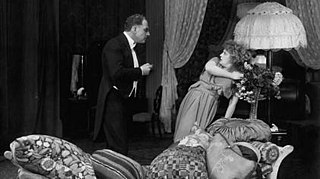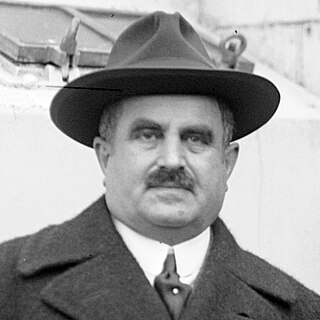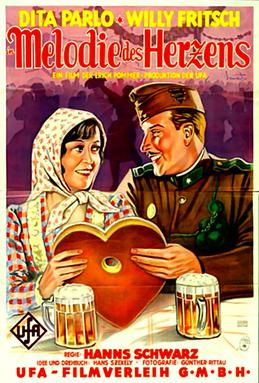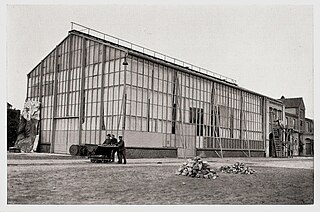Related Research Articles

DEFA was the state-owned film studio of the German Democratic Republic throughout the country's existence.
UFA GmbH, shortened to UFA, is a film and television production company that unites all production activities of the media conglomerate Bertelsmann in Germany. The original UFA was established as Universum-Film Aktiengesellschaft on December 18, 1917, as a direct response to foreign competition in film and propaganda. UFA was founded by a consortium headed by Emil Georg von Stauß, a former Deutsche Bank board member. In March 1927, Alfred Hugenberg, an influential German media entrepreneur and later Minister of the Economy, Agriculture and Nutrition in Adolf Hitler's cabinet, purchased UFA and transferred ownership of it to the Nazi Party in 1933.

The Wandering Image is a 1920 German silent drama film directed by Fritz Lang and starring Mia May, Hans Marr and Rudolf Klein-Rogge. It is also known by the alternative titles of The Wandering Picture and The Wandering Shadow.

Paul Davidson was a German film producer.

Melody of the Heart is a 1929 German musical film directed by Hanns Schwarz and starring Dita Parlo, Willy Fritsch and Gerő Mály.

The White Peacock is a 1920 German silent drama film directed by Ewald André Dupont and starring Guido Herzfeld, Hans Mierendorff and Karl Platen. It was shot at the Tempelhof Studios in Berlin. The film's sets were designed by the art directors Paul Leni, Robert A. Dietrich and Otto Moldenhauer

The Goose of Sedan is a 1959 French-West German comedy war film directed by Helmut Käutner and starring Hardy Krüger, Jean Richard and Dany Carrel. It was based on the novel Un Dimanche au Champ D'Honneur by Jean L'Hôte. The film was one of a growing number of co-productions between the two countries during the era. It was also released under the alternative title Without Trumpet or Drum.

Othello is a 1922 German silent historical romantic drama film directed by Dimitri Buchowetzki, and starring Emil Jannings, Werner Krauss and Ica von Lenkeffy. It was based on William Shakespeare's play The Tragedy of Othello, the Moor of Venice, the first of six major film adaptations of the work. It was shot at the Johannisthal Studios in Berlin. The film's sets were designed by the art director Karl Machus.

Chaste Susanne is a 1926 German silent comedy film directed by Richard Eichberg and starring Lilian Harvey, Willy Fritsch and Ruth Weyher. It is based on the 1910 operetta Die keusche Susanne composed by Jean Gilbert with a libretto by Georg Okonkowski. In Britain it was released under the alternative title The Girl in the Taxi in reference to The Girl in the Taxi in the English version of the operetta. The film's art direction is by Jacek Rotmil. It was filmed at the Johannisthal Studios in Berlin.
The Prince of Rogues is a 1928 German silent drama film directed by Curtis Bernhardt and starring Hans Stüwe, Lissy Arna and Albert Steinrück. It was shot at the Johannisthal Studios in Berlin. The film's art direction was by Heinrich Richter. The story depicts the life of the 18th century outlaw Schinderhannes. It is based on a 1927 play Schinderhannes by Carl Zuckmayer.

Across the Desert is a 1936 German adventure film directed by Johann Alexander Hübler-Kahla and starring Fred Raupach, Heinz Evelt and Aruth Wartan. It was based on a novel by Karl May. It was the first sound adaptation of a May novel, and the only one to be produced during the Nazi era. Set in the Ottoman Empire during the Nineteenth century, it portrays a series of oriental adventures of the two travellers Kara Ben Nemsi and Hadschi Halef Omar.

Tobis Film was a German film production and film distribution company. Founded in the late 1920s as a merger of several companies involved in the switch from silent to sound films, the organisation emerged as a leading German sound studio. Tobis used the Tri-Ergon sound-on-film system under the Tobis-Klang trade name. The UFA production company had separate rights to the Tobis system, which it used under the trade name of Ufa-Klang. Some Tobis films were released in Germany by the subsidiary Europa Film.
Gloria Film was a West German film production and distribution company. It was established in 1949 by Ilse Kubaschewski. An earlier, unconnected company of the same name had existed during the silent era in Germany, and had been absorbed into UFA in the 1920s. During the 1930s an Austrian production company also called itself Gloria.
Staaken Studios was a film studio located in Staaken on the outskirts of the German capital Berlin. A large former zeppelin hangar, it was converted to film use following the First World War and operated during the Weimar Republic. In July 1923 it was the largest studio in the world, with floor space of around 18,000 square feet. It was used for the construction of massive sets on a series of major productions of the silent era, including I.N.R.I., Metropolis, The Holy Mountain and The Ship of Lost Souls. These epics were a part of the German attempt on world markets during the decade. The 1927 Anglo-German co-production The Ghost Train was shot at Staaken.

The Tempelhof Studios are a film studio located in Tempelhof in the German capital of Berlin. They were founded in 1912, during the silent era, by German film pioneer Alfred Duskes, who built a glass-roofed studio on the site with financial backing from the French company Pathé. The producer Paul Davidson's PAGU then took control and constructed a grander structure. The First World War propaganda drama The Yellow Passport, the historical comedy Madame DuBarry and the expressionist 1920 silent film The Golem were made there by PAGU.

The Weissensee Studios was a collection of separate film production studios located in the Berlin suburb of Weißensee during the silent era.
The Spandau Studios or CCC Studios were film and television studios located in Spandau, a suburb of Berlin. They were established in 1949 following the Second World War by the producer Artur Brauner controller of CCC Films, on the site of a former factory. Following the Soviet occupation of East Germany, most of the major film studios in the capital had fallen into the East Berlin with the exception of the Tempelhof Studios until Brauner opened his own studios.

The Terra Studios or Marienfelde Studios were film studios located in the Berlin suburb of Marienfelde.
Eiko Film was a German film production company of the silent era. It was established in 1912 by the producer Franz Vogel and swiftly became one of Germany's more important companies. Having initially produced its films at the Rex Film studios in Berlin, the company moved to construct the Marienfelde Studios in the suburb of that name. A glasshouse studio, it was part of Germany's growing film infrastructure. During the First World War era, when foreign imports were largely excluded from the German market, the company enjoyed success with its productions. In 1922, the company and its Marienfelde Studios were acquired by Terra Film, although the name Eiko was used by productions released by the rival National Film until later in the decade.